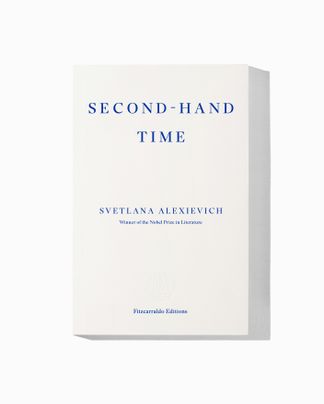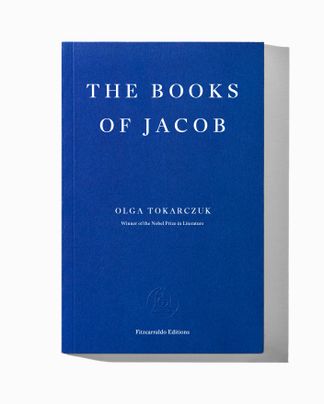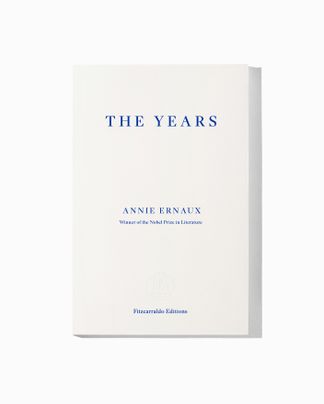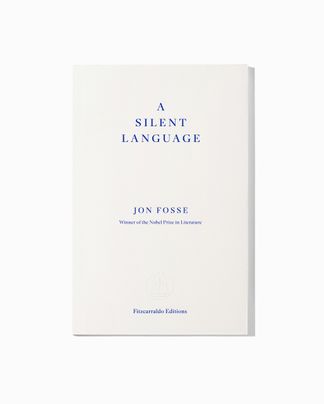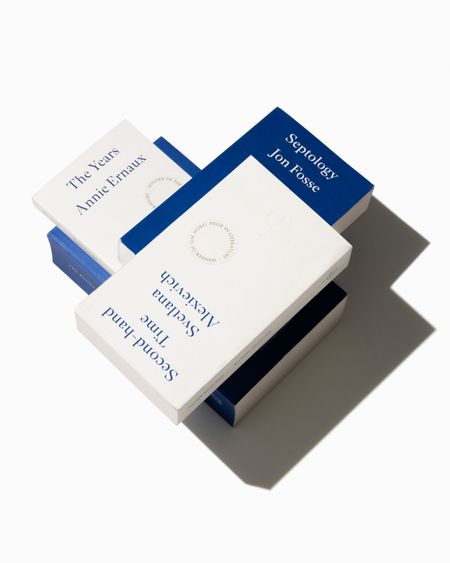Winner of the 2023 Nobel Prize in Literature
What makes us who we are? And why do we lead one life and not another? Asle, an ageing painter and widower who lives alone on the southwest coast of Norway, is reminiscing about his life. His only friends are his neighbour, Åsleik, a traditional fisherman-farmer, and Beyer, a gallerist who lives in the city. There, in Bjørgvin, lives another Asle, also a painter but lonely and consumed by alcohol. Asle and Asle are doppelgängers – two versions of the same person, two versions of the same life, both grappling with existential questions about death, love, light and shadow, faith and hopelessness. Septology is a transcendent exploration of the human condition by Jon Fosse, the 2023 Nobel Prize in Literature laureate, and a radically other reading experience – incantatory, hypnotic and utterly unique.
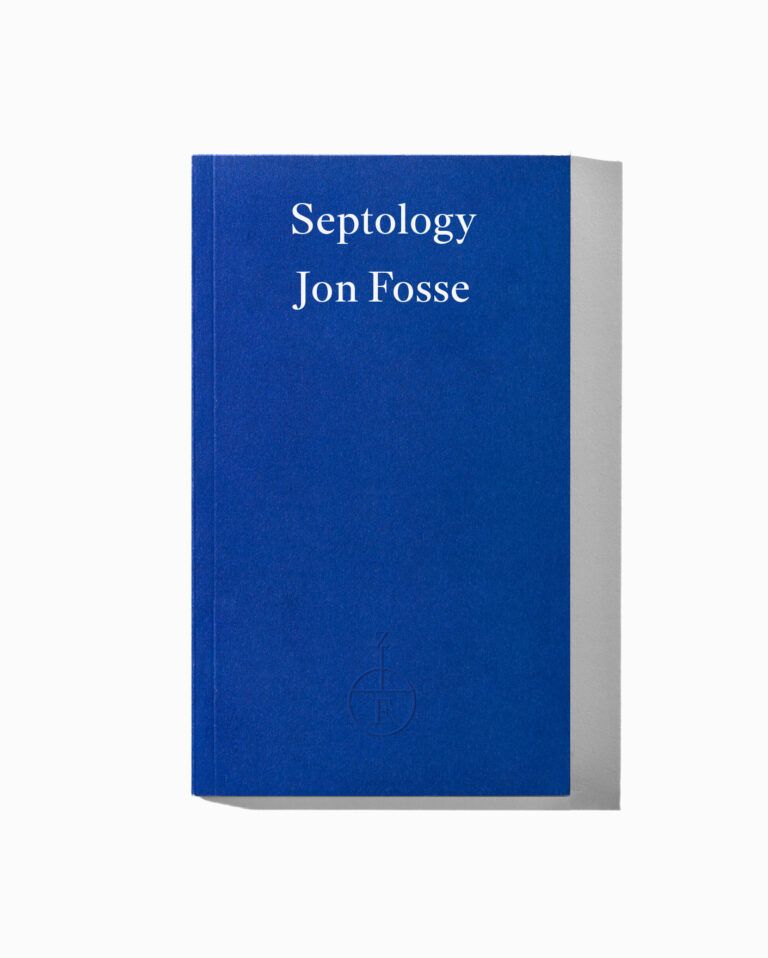
Septology
Translated by Damion Searls
Published 2 November 2022 | Paperback, 832 pages
Shortlisted for the 2022 International Booker Prize | Winner of the 2021 Brage Prize | Winner of the 2021 Norwegian Critic’s Prize | Longlisted for the 2022 Oxford-Weidenfeld Prize
Septology
Translated by Damion Searls
I.
And I see myself standing and looking at the picture with the two lines that cross in the middle, one purple line, one brown line, it’s a painting wider than it is high and I see that I’ve painted the lines slowly, the paint is thick, two long wide lines, and they’ve dripped, where the brown line and purple line cross the colours blend beautifully and drip and I’m thinking this isn’t a picture but suddenly the picture is the way it’s supposed to be, it’s done, there’s nothing more to do on it, I think, it’s time to put it away, I don’t want to stand here at the easel any more, I don’t want to look at it any more, I think, and I think today’s Monday and I think I have to put this picture away with the other ones I’m working on but am not done with, the canvases on stretchers leaning against the wall between the bedroom door and the hall door under the hook with the brown leather shoulderbag on it, the bag where I keep my sketch-pad and pencil, and then I look at the two stacks of finished paintings propped against the wall next to the kitchen door, I already have ten or so big paintings finished plus four or five small ones, something like that, fourteen paintings in all in two stacks next to each other by the kitchen door, since I’m about to have a show, most of the paintings are approximately square, as they put it, I think, but sometimes I also paint long narrow ones and the one with the two lines crossing is noticeably oblong, as they put it, but I don’t want to put this one into the show because I don’t like it much, maybe all things considered it’s not really a painting, just two lines, or maybe I want to keep it for myself and not sell it? I like to keep my best pictures, not sell them, and maybe this is one of them, even though I don’t like it? yes, maybe I do want to hold onto it even if you might say it’s a failed painting? I don’t know why I’d want to keep it, with the bunch of other pictures I have up in the attic, in a storage room, instead of getting rid of it, or maybe, anyway, maybe Åsleik wants the picture? yes, to give Sister as a Christmas present? because every year during Advent I give him a painting that he gives to Sister as a Christmas present and I get meat and fish and firewood and other things from him, yes, and I mustn’t forget, as Åsleik always says, that he shovels the snow from my driveway in the winter too, yes, he says things like that too, and when I say what a painting like that can sell for in Bjørgvin Åsleik says he can’t believe people would pay so much for a painting, anyway whoever does pay that much money must have a lot of it, he says, and I say I know what you mean about it being a lot of money, I think so too, and Åsleik says well in that case he’s getting a really good deal, in that case it’s a very expensive Christmas present he’s giving Sister every year, he says, and I say yes, yes, and then we both fall silent, and then I say that I do give him a little money for the salt-cured lamb ribs for Christmas, dry-cured mutton, salt cod, firewood, and for shovelling the snow, maybe a bag with some groceries that I bought in Bjørgvin when I’ve gone there to run an errand, I say, and he says, a little embarassed, yes I do do that, fair’s fair, he says, and I think I shouldn’t have said that, Åsleik doesn’t want to accept money or anything else from me, but when I think about how I have enough money to get by and he has almost none, yes, well, I slip him a few more bills, quickly, furtively, as if neither of us knows it’s happening, and when I go run errands in Bjørgvin I always buy something for Åsleik, I think, because I may not make much money but he makes almost nothing compared to me, I think, and I look at the stack of finished paintings with the homemade stretchers they’re on facing out and every painting has a title painted in thick black oil paint on the top board of the stretcher, and the painting I’m looking at the back of, at the front of the stack, is called And the Waves Beat Their Message, titles are very important to me, they’re part of the picture itself, and I always paint the title in black on the top of the stretcher, I make my stretchers myself, I always have and I always will as long as I paint pictures, I think, and I think that there may actually be too many paintings here for a show but I’ll take them all to The Beyer Gallery anyway, Beyer can put some of them in the side room of the gallery, in The Bank, as he calls the room where he stores pictures that aren’t in the show, I think, and then I take another look at the picture with the two lines crossing, both in impasto as they put it, and the paint has run a little and where the lines cross the colours have turned such a strange colour, a beautiful colour, with no name, they usually don’t have names because obviously there can’t be names for all the countless colours in the world, I think and I step a few feet back from the picture and stop and look at it and then turn off the light and stand there looking at the picture in the dark, because it’s dark outside, at this time of year it’s dark, or almost dark, all day long, I think and I look at the picture and my eyes get used to the darkness and I see the lines, see them cross, and I see that there’s a soft light in the painting, yes, a soft invisible light, well then yes so it probably is a good painting, maybe, I think, and I don’t want to look at the picture any more, I think, but still I’m standing and looking at it, I have to stop looking at it now, I think, and then I look at the round table over by the window, there are two chairs next to it and one of them, the one on the left, that’s where I sat and sit, and the right-hand one was where Ales always sat, when she was still alive, but then she died, too young, and I don’t want to think about that, and my sister Alida, she died too young too, and I don’t want to think about that either, I think, and I see myself sitting there in my chair looking out at the fixed point in the waters of the Sygne Sea that I always look at, my landmark, with the tops of the pines that grow below my house in the middle of the centre pane in the bisected window, in the right-hand part, because the window is divided in two and both parts can be opened and each side is divided into three rows and the tops of the pines will be in the middle row of the right side and I can make out the pines and I’ve found the mark, right at the midline I can see waves out there in the darkness and I see myself sitting there looking at the waves and I see myself walking over to my car where it’s parked in front of The Beyer Gallery, I’m there in my long black coat with my brown leather bag over my shoulder, I’ve just been to The Coffeehouse, I didn’t have much of an appetite, I often don’t, and just skip dinner, but today I’ve had a simple open-faced groundbeef sandwich with onions and now the day’s over and I’ve bought everything I wanted to buy in Bjørgvin so now it’s time for me to drive home to Dylgja, after all it’s a long drive, I think, and I get into the car, I put the brown shoulderbag down on the passenger seat and start the car and then leave Bjørgvin the way Beyer taught me, one day he showed me the way, showed me how to drive into Bjørgvin and out of Bjørgvin, how to get to The Beyer Gallery and then leave The Beyer Gallery the same way going in the opposite direction, I think, and I’m driving out of Bjørgvin and I fall into the nice stupor you can get into while you’re driving and I realize I’m driving right past the apartment building where Asle lives, in Sailor’s Cove, right at the edge of the sea, there’s a little wharf in front of it, I think, and I see Asle lying there on his sofa and he’s shaking, his whole body’s shivering, and Asle thinks can’t this shaking stop?
(…)
‘Jon Fosse is a major European writer.’
— Karl Ove Knausgaard
‘Fosse has written a strange mystical moebius strip of a novel, in which an artist struggles with faith and loneliness, and watches himself, or versions of himself, fall away into the lower depths. The social world seems distant and foggy in this profound, existential narrative.’
— Hari Kunzru, author of White Tears
‘I hesitate to compare the experience of reading these works to the act of meditation. But that is the closest I can come to describing how something in the critical self is shed in the process of reading Fosse, only to be replaced by something more primal. A mood. An atmosphere. The sound of words moving on a page.’
— Ruth Margalit, New York Review of Books
‘Septology feels momentous.’
— Catherine Taylor, Guardian
‘Having read the Norwegian writer Jon Fosse’s Septology, an extraordinary seven-novel sequence about an old man’s recursive reckoning with the braided realities of God, art, identity, family life and human life itself, I’ve come into awe and reverence myself for idiosyncratic forms of immense metaphysical fortitude.’
— Randy Boyagoda, New York Times
‘He touches you so deeply when you read him, and when you have read one work you have to continue…. What is special with him is the closeness in his writing. It touches on the deepest feelings that you have – anxieties, insecurities, questions of life and death – such things that every human being actually confronts from the very beginning. In that sense I think he reaches very far and there is a sort of a universal impact of everything that he writes. And it doesn’t matter if it is drama, poetry or prose – it has the same kind of appeal to this basic humanness.’
— Anders Olsson, Nobel committee
‘Fosse intuitively — and with great artistry — conveys … a sense of wonder at the unfathomable miracle of life, even in its bleakest and loneliest moments.’
— Bryan Karetnyk, Financial Times
‘The entire septet seems to take place in a state of limbo…. Though Fosse has largely done away with punctuation altogether, opting instead for sudden line breaks, his dense, sinuous prose is never convoluted, and its effect is mesmerizing.’
— Johanna Elster Hanson, Times Literary Supplement
‘The translation by Damion Searls is deserving of special recognition. His rendering of this remarkable single run-on sentence over three volumes is flawless. The rhythms, the shifts in pace, the nuances in tone are all conveyed with masterful understatement. The Septology series is among the highlights of my reading life.’
— Rónán Hession, Irish Times
‘Time soon loses its meaning, or at least some of its hold over us. Picking up Septology after a while is like slipping back into a gently flowing river, your body buoyed by the current of “and”s, “yes”s and “I think”s. Memories, everyday observations, prayer, spectres of lives not lived – these all bleed into one seamless whole.… The effect is subtle and cumulative. Any attempt to isolate and analyse it collapses its magic, like a kind of literary quantum phenomenon.’
— Frazer McDiarmid, Oxford Review of Books
‘The narrative keeps circling, inching slowly, as interior monologues sometimes do, and the way a painting might gradually appear from a cumulation of small brushstrokes. The effect is meditative, devotional, like the rhythm of the Christian liturgy…. The reader may sometimes feel weary with the amount of words here too. But there is generosity. And persistence, like in the rituals of worship and devotion, is rewarded.’
— Nick Mattiske, Insights
Jon Fosse was born in 1959 on the west coast of Norway and is the recipient of countless prestigious prizes, both in his native Norway and abroad. Since his 1983 fiction debut, Raudt, svart [Red, Black], Fosse has written prose, poetry, essays, short stories, children’s books and over forty plays. In 2023, he was awarded the Nobel Prize in Literature ‘for his innovative plays and prose which give voice to the unsayable’.
Damion Searls is a translator from German, Norwegian, French and Dutch, and a writer in English. He has translated nine books by Jon Fosse, including the three books of Septology.

